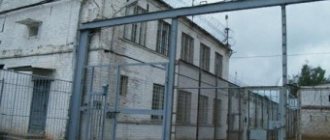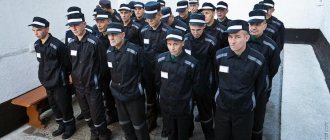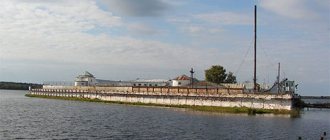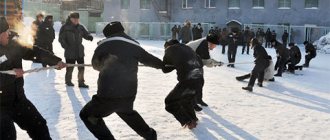I am a person who has never had close contact with court proceedings and various crimes before. I have no idea what a special regime prison is, or how criminals are kept in special regime colonies. I had to come into contact with this issue after my stepfather ended up in prison. I had to go there a couple of times to deliver the parcel. What I saw greatly surprised me, so I decided to write an article on this topic. After studying it, you can get answers to the following questions:
- The official definition and concept of a special regime colony.
- Basic conditions and rules of stay.
- Differences between a standard maximum security colony and a regular prison.
- Differences between modes.
- Which maximum security colonies operate in the Russian Federation.
Definition of a special regime colony
A special regime colony is a special institution designed for the complete social isolation of criminals involved in particularly serious criminal acts from modern society. According to official art. 58 and 74 of the PEC, this institution admits the following persons:
- Repeat offenders are especially dangerous for society and the state. These are people who have committed crimes while in other places of detention.
- Prisoners sentenced to life imprisonment by the court.
- “Death row” are people for whom execution was officially canceled on the basis of a previously established and accepted moratorium.
- Prisoners placed in stricter conditions by decision of the prison administration.
What is the difference between strict regime and special regime?
For CIS countries, prison is a rather rare form of punishment. For example, in Russia, many prisoners are placed in colonies. The camps are divided into four classes: special settlements (located far from cities and villages), general, strict and special regime.
Let's look at the difference between special and strict regimes
:
| Special regime | Strict regime | |
| Structure | Unlimited security requirements. The possibility of escape is approaching zero. | High requirements for content safety. |
| Contingent | Particularly dangerous relapse, sentenced to life. | Serious crimes, rape. |
| Dating | 2 short-term (4 hours) + 2 long-term (48 hours) | 3 short-term + 3 long-term (up to 72 hours) |
| Expense of funds | 1 minimum wage per month | 2 minimum wage |
Conditions of stay
Criminals who serve their sentences in a special or strict regime penal colony are, as a rule, kept in different conditions. They can be ordinary, strict, more loyal and lightweight, or especially strict.
Each of the established regimes has its own unprecedented measures aimed at fully ensuring security. They are aimed at reducing the likelihood of escape to zero.
Strict conditions
Criminals who have committed violations of established regime requirements in standard correctional colonies are sent to colonies with strict conditions of stay. Prisoners here live in exclusively cell-type rooms and are endowed with the following rights:
- Every month, spend an amount equal to 70% of the established minimum wage on daily hygiene items and groceries.
- Have two short dates per year.
- Receive one small parcel and one full parcel per full year.
- Daily walks - duration up to 1.5 hours. While in the air, any communication is strictly prohibited.
- Work in a chamber specially equipped for this purpose.
If a prisoner shows ideal behavior without violations for a year, he can count on being redirected to a colony with normal conditions.
Colony with normal conditions
Here are convicts sent by the court to a special regime colony. Based on modern legislation, which is relevant in the Russian Federation, such prisoners live in special dormitories. Prisoners have the following rights:
- Make purchases in the store in the amount of one minimum wage per month. Food and various basic necessities are purchased. The money spent is written off from the person placed under arrest.
- It is allowed to organize 2 three-day visits and 4 four-hour visits per year.
- Three parcels weighing up to 2-3 kg and three parcels weighing up to 20 kg are allowed per year.
- Taking one and a half hour walks. If a person has no comments, the walking time will be automatically increased to two full hours.
If a person lives in such conditions for a full year and receives no reprimand from his superiors, he will be transferred to a regime with lighter conditions based on an official application.
Colony with significantly easier conditions
If a criminal who is in standard conditions behaves approximately, if he does not break the rules, he is automatically transferred to conditions with increased comfort levels. They consist of the following factors:
- You can live in a dormitory.
- Every month you can spend an amount equal to 2 minimum wages. Allowed three short and long-term visits per year.
- You are allowed to receive up to 6 passes.
- Walks for 1.5 hours every day.
If a prisoner violates the rules of stay, he is immediately transferred to a settlement of normal or stricter regime.
Special strict conditions of stay
A prison with this regime is characterized by enhanced conditions. Dangerous violators come here. Enhanced measures have been installed here to ensure a high level of security. The reason is that this category of people is prone to regular violation of established rules, escape, and suicide.
Such colonies have adopted both standard legislative rules and their own internal rules. Criminal individuals are constantly monitored by a “watcher.”
There are no women's colonies with a particularly strict regime in Russia.
Don't be afraid of pressure
It is very difficult to stop paying for unofficial services in a pre-trial detention center. Especially if you are overpaying.
Pyotr Dobrovitsky : If an entrepreneur immediately sets himself firmly that he will not pay, in very rare cases they will try to put pressure on him, but in most cases they will still leave him alone. But people who paid and then stopped will most likely be put under quite a lot of pressure. When a person, after caviar and cognac, switches to moonshine and cucumbers, the employee serving him gets very upset. So it's better not to pay right away.
Zoya Svetova, member of the Public Monitoring Commission : In recent years, there have been stories in Moscow pre-trial detention centers where prisoners were extorted money by threatening them with beatings. But they extorted after the person had paid once or twice, and this was not for improving conditions, but simply because they went too far. There were similar stories in pre-trial detention center-4 and pre-trial detention center-5.
A person under investigation, who served four sentences, performed the duties of a camera watcher in a pre-trial detention center : If the thieves have their eyes on the “bun and butter”, they will still achieve their goal. They will create situations and problems for you, for the solution of which you will pay, and you will also be grateful that they took this money from you. In order to pay, they can be transferred to a cell with crazy Chechens. In one cell there was one, he got up in the middle of the night and attacked the sleeping people with a knife, threatening to kill. The camera stood up, they calmed him down, saying, be quiet, brother. The sweet guy we sent to the Chechen ended up begging for money if only he would be transferred from his cell. But you can do without the Chechens: if you refuse to give money during quarantine, you are transferred to a worse cell, where there are only 20 bunks for 40 people. Cellmates might piss on the mattress. They may not take you to the shower for three weeks.
Differences from prison
There are certain differences between a standard prison and an OS colony:
- People who are kept in a standard institution cannot, even for exemplary behavior, be transferred to a settlement or to a less strict prison. However, they may be released on parole.
- If a prisoner is transferred from a penitentiary institution, he is placed in conditions similar to the previous ones.
- Criminals who work have the right to take full paid leave once a year and even spend it outside the territory.
- Prisoners who received life sentences live in special premises, which in terms of area and arrangement are designed for two offenders. If necessary, they are housed alone.
- In a special regime zone, the daily routine is constantly observed. Personal time, work, sports, meals and recreational social activities are provided.
For people who have committed offenses and are placed in isolation wards, an individual schedule is drawn up.
Work in a colony: disadvantages and advantages of compulsory labor in captivity
Working in a correctional institution is the responsibility of the prisoner, which directly follows from Article 103 of the Penal Code, according to which every convicted person is obliged to work in places and jobs determined by the administration. The responsibility of the administration, in turn, is to attract convicts to work “taking into account their gender, age, ability to work, state of health and, if possible, specialty, as well as based on the availability of jobs.”
Refusal to work is clearly regarded by the authorities as a malicious violation, which leads to the placement of the convicted person in a punishment cell and thereby makes it almost impossible for him to be released on parole. However, there are colonies in which employment is a privilege, since there are not enough vacancies for convicts and the administration has the opportunity to choose who to appoint to what positions.
The management of the institution, as a rule, is strongly interested in ensuring that as many prisoners as possible work. First of all, everyone employed in production brings a good profit to the colony, and in addition it is believed that the less free time the special contingent has, the easier it is to control it.
Convicts are also interested in work, since the likelihood of being released on parole is higher if they have labor camp experience. For good, conscientious work, you can regularly receive incentives, which often lead to a softening of the regime and a number of concessions (increasing the number of packages and parcels, increasing the amount that can be spent from a personal account in a store, etc.). In addition, employment is an important element in the reference certificate prepared by the head of the detachment, which is prepared at the parole commission and then submitted to the court. (here is a link to the card about parole). And finally, time in prison for a non-working person passes much more slowly.
Theoretically, wages should have been a good help for the convicted person, especially if the relatives are not rich, but there are dependents left, and even more so if there is material damage from the crime recognized by the court that must be compensated. However, very rarely the salary is enough for anything other than buying food and basic necessities in the store at the colony (more details about the store in the RS card)
There is a fairly common practice when convicted persons are employed in accordance with Art. 106 of the Penal Code i.e. in fact, on a voluntary basis: as a general rule, each prisoner is obliged to work for free on work to improve the colony and the surrounding area for no more than two hours a week, but “upon a written statement from the convicted person” or “by decision of the authorities on the need for urgent work,” the duration can be increased .
Along with this, another common practice is dividing one bet into parts. A convict registered at 0.1 rate, for example, of an orderly detachment, receives 10% of his due salary. Minus deductions for clothing, food, and utility costs, you may end up with 40 rubles a month. Convicts employed in positions involving physical labor in production do not have any relief from the administration of the institution. Well, except that they get the opportunity to use the equipment and the acquired skills of working on it for their personal interests (for example, you can sew a comfortable and outwardly more attractive robe for yourself or others), and can visit the bathhouse complex every day (the rest of the convicts are entitled to a bathhouse once a week).
Prisoners who occupy positions related to organizational work (supply managers, orderlies, senior facilities - clubs, bathhouses, temples, canteens, etc.) feel more at ease. They are in systematic contact with representatives of the colony administration; they are usually known by their first and last names, and by sight. In their regard, a number of concessions are allowed on the part of the employees (elements of civilian clothing are allowed, more informal communication with FSIN employees, free movement throughout the territory of the colony, etc.). Many still do so while in quarantine immediately after arriving at the colony (about admission to the colony - in the MS card). offer to secure appointment to a good position for a monetary reward. You cannot agree right away, as this may turn out to be a scam. The practice of being assigned to a good job for money actually exists in some colonies, but immediately entering into such contractual relationships with unfamiliar prisoners is dangerous: they can deceive you, and then it will be impossible to return the money.
It is reasonable to tell every employee of the prison administration immediately after arriving at the colony that you are ready to work because you are interested in being released on parole. When assigned to a job, agree with what is offered and work, while at the same time establishing contacts among convicts and finding out what opportunities there are for more comfortable and interesting employment and who could help with this.
Share link:
Colonies of the Russian Federation
Many people wonder what kind of colonies with a special strict regime exist in Russia and how many are there? There are several existing institutions of this kind:
- "White Swan" is a Solikamsk prison. It is characterized by rather harsh conditions.
- “Black Dolphin” is one of the largest colonies in terms of the number of criminals. Dangerous offenders are sent here - maniacs, serial killers and rapists. They are under 24-hour video surveillance. You can move around the territory with a blindfold. You should sleep exclusively by lamplight. Violation of the law results in severe penalties.
- The Polar Owl is a northern colony located above the Arctic Circle. This is an institution for people who have received life sentences. Quite strict living conditions are established here; this nuisance is complemented by a year-round temperature of minus 35-40 degrees, which remains almost constant.
- “Black Golden Eagle” - the colony is located in the taiga near Sverdlovsk. Famous modern serial killers serve their sentences in this institution.
- “Vologda Pyatak” is a special colony in terms of location. It is also called the Russian Alcatraz. The establishment is located on an island. This completely eliminates the possibility of escape. Since the beginning of 1996, prisoners who have been sentenced to life imprisonment by the court have been staying here.
Let's sum it up
- A special regime colony is a specialized institution, originally built and intended exclusively for the complete isolation of people convicted of particularly serious crimes.
- The following categories of violators are admitted to the colony: repeat offenders, prisoners sentenced to life by the court, “death row” prisoners, as well as prisoners placed in more strict conditions by decision of the prison administration.
- Criminals who are serving sentences imposed by the court are kept in different conditions - ordinary, strict, light or especially strict.
- Each mode has its own security measures. They are aimed at reducing the possibility of escape to zero.
- If a prisoner shows ideal behavior throughout the year, he has the right to count on redirection to a colony with loyal conditions of stay.
- There are currently no women's colonies with a special regime.
What is the difference between a prison and a maximum security colony?
First, let's look at the fundamental terms described in the Criminal Code of the Russian Federation - the difference between imprisonment and a maximum security colony
:
- Prison
is the worst place a prisoner can end up. A man sits in a cell all day. The exception is a daily walk, which, as a rule, does not exceed 45-60 minutes; - A maximum security colony
is a specialized penitentiary organization designed to correct a person’s character by involving the latter in labor work.
| Jail | The colony | |
| Accommodation | Cameras. There are bars on the windows. From 5 to 10 people live. | A spacious room, somewhat reminiscent of an army barracks. The number of prisoners is more than a dozen. |
| Pastime | 24/7 in a cell. | During the day in the industrial zone (employment), in the evening in the barracks. There is 1 day off. |
| Contingent | Repeat offenders, thieves in law, prisoners with previous sentences. | For serious crimes. |
In fact, the abovementioned penitentiary structures perform similar functions. The difference is one thing: if in a colony the leadership and administration of the colony still hopes to correct the fate of the prisoner, then people are placed in prison whose prospects for rehabilitation are zero.
Next, we recommend watching a video about the most famous prison in Russia - Vladimir Central, and the conditions in which prisoners live there:











